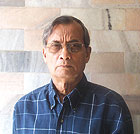|
Digital Library of India: A Lopsided Approach
|

|
|
|
|
Digital library development in India can be grouped into local digital library projects, national specialised digital library. Local digital library projects would include rich digital cultural materials from local libraries that can be accessed through networks. This project would incorporate non-library materials, local records, artifacts, audio and video items reflecting local historical perspective and current developments.
The national programme for science and technology would make possible the wide and rapidly increasing availability of digital information resources at various R&D centres and higher academic institutions. For example, the Indian National Digital Library in Engineering and Technology
(INDEST) based at IIT Delhi to develop consortium for engineering and technology libraries for nurturing core digital collections in these areas. |
|
Unlike the world’s other national libraries, our National Library has failed to take up the leadership role. The library does not have IT manpower |
|
There are several on-going projects in India, not strictly within the conventional library domain. These may be grouped under national specialized digital library systems. Vidyanidhi - a project initiated by the Department of Library and Information Science, University of Mysore, supported by DSIR, Ford Foundation and Microsoft, is involved in digitising and hosting theses and dissertations of Indian Universities and academic institutions; and the National Mission for Manuscripts (based in IGNCA, New Delhi), is engaged in preserving traditional Indian manuscripts.
The Indian Institute of Sciences, Bangalore having a strong IT base, has taken the lead role in setting up a National Digital Library and/or Digital Library of India (DLI). The DLI project gives priority to research and development of suitable software with funds received from the government and US agencies.
The project team has done a good deal of scanning, starting from the ‘gift of 100,000 English language books’ received under the Carnegie Mellon University’s (CMU) Universal Digital Library Project of Million Books. A sample check of these titles, made by a US university library with strong South Asia core collection base, indicates that about 60% of these are obsolete, and not worth preserving digitally. By ‘gifting ‘these books to India, China and Egypt, CMU wants to develop appropriate software for its Universal Digital library of Million Books at the lowest cost.
Most of the 22 Indian organisations currently involved in with IT and/or ST background are based in Southern India. None of the Indian libraries of national importance and major cultural or academic institutions such as the University of Mumbai, Bhandarkar Oriental Research Institute, Parliament Library, Khuda Baksh Oriental Public Library, Indira Gandhi National Centre for the Arts, are included in the DLI project. However, the DLI Board has issued a fatwa asking institutions with or without digitalisation programme to support this national effort by providing digitised copies of their valuable resource materials. The exclusion of these institutions from direct involvement has raised strong misgivings about its long term sustainability.
National Library, the largest library in India, is engaged in a project of digitising rare pre-1900 English books and documents, and pre-1920 Indian vernacular languages publications. Over three million pages have already been digitised. It has recently taken up digitalisation of its large old newspaper collections. Several such initiatives have been taken up since 2000 by a few academic and research institutions. Unlike the world’s other national libraries, the Indian National Library has failed to take up the leadership role. The library does not have the essential IT manpower component. None of the library professional associations has ever voiced their opinion on this crucial issue.
The existing policy of allowing NIC, C-DAC, etc. to take care of all IT requirements of all such central government funded bodies is partly responsible for such a situation. No doubt Indian IT experts are fully involved in developing requisite software for DLI to provide reading materials to every Indian student in every Indian language. But to digitise India’s national heritage repositories—both printed and electronic—received under the Delivery of Books Act (being amended) including materials in multimedia and artifacts may not be possible for the DLI team for this lopsided approach. Any further delay in bringing these institutions into centre-stage may force DLI out of the global race. Is anyone listening? |
|
—The writer Subhas C Biswas was the
former Director, Central Sect. Library &
former President, Indian Library Association.
For Details Contact: subhas.biswas@gmail.com |
|
|
|
|
|
December 2006
|
|

|
|
|
|